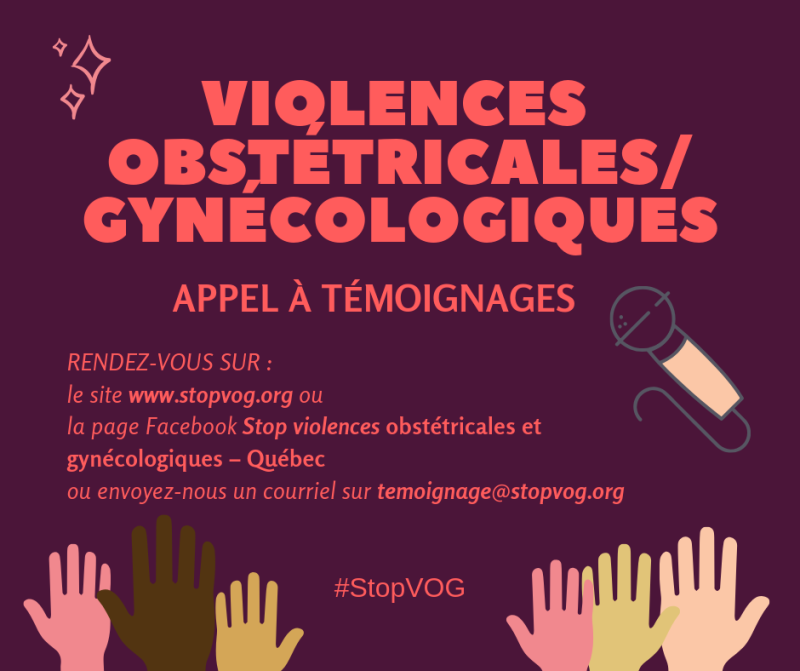Gynecological and Obstetric Violence: Call for Personal Accounts
 This call is issued as part of an awareness campaign against gynecological and obstetric violence (GOV), which affects women, trans men, non-binary individuals and two-spirit people.
This call is issued as part of an awareness campaign against gynecological and obstetric violence (GOV), which affects women, trans men, non-binary individuals and two-spirit people.
You may have experienced this form of violence if (this list of examples is non-exhaustive):
- You have felt that your body was disrespected or that your dignity was violated.
- A medical intervention was carried out without discussion and without your consent (for example, fingers inserted in your vagina without warning or asking your permission).
- You were led to believe that you had no choice but undergo a medical intervention or accept the presence of medical students or residents during your exam.
- You were coerced into accepting an intervention (for example, you were asked to make a decision while being threatened, or were threatened with a call to the DYP).
- You were prevented from moving while giving birth, forced to stay on your back during the birth or prevented from eating or drinking.
- The advantages and disadvantages, as well as the consequences and possible alternatives, of an intervention, medication or contraceptive method were not explained to you.
- You were refused a temporary or permanent method of contraception.
Gynecological and obstetric violence is systemic and gendered. Related to reproductive and sexual health, this violence occurs in contexts of gynecological or obstetric care. It can be experienced during a birth, miscarriage or abortion, as well as a gynecological appointment, an ultrasound or mammogram. Those living at the intersection of multiple systems of oppression, including Indigenous women, racialized women, women who have suffered from FGM, women living with a disability, lesbian women, and trans and non-binary people are at a higher risk of experiencing this type of violence.
The very existence of gynecological and obstetric violence is rooted in a patriarchal system with contempt for women's bodies and non-conforming bodies. It also stems from a deficient health care system that prioritizes performance over taking the time to listen to patients. Patient-centered care is impossible in such a system. Yet decision-makers refuse to recognize the problem.
Your story could make a difference! We're calling for anyone who thinks they have experienced gynecological or obstetric violence to submit their account of what happened and to file a complaint with the appropriate authorities. Anyone who has witnessed gynecological or obstetric violence against another person is also invited to submit their account (health care professional, doula, student, etc.).
Visit the site www.stopvog.org or the Facebook page Stop violences obstétricales et gynécologiques (#StopVOG) or send your story by email to temoignage@stopvog.org.
This campaign was developed by the Collective du 28 mai:
Action Cancer du sein; Action des femmes handicapées (Montréal); Ariane K – Consultante périnatale; Centre de solidarité lesbienne; Centre des femmes d’ici et d’ailleurs; Fédération des femmes du Québec; Fédération du Québec pour le planning des naissances; Regroupement Naissance-Renaissance; Regroupement québécois des CALACS; Réseau d’action pour l’égalité des femmes immigrées et racisées du Québec; Quebec Lesbian Network – Femmes de la diversité sexuelle; Réseau des tables régionales de groupes de femmes du Québec.